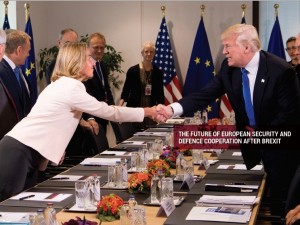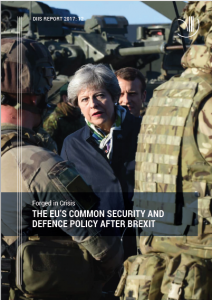The EU’s Common Security and Defence Policy After Brexit
By Christine Nissen
In a recent DIIS report, Christine Nissen discusses the transpiring changes in the common security and defense policy arena in the European Union after Brexit. She explains how the exit of the UK from the EU has caused one of the most important internal crises for the Union, specifically in relation to policy areas such as security and defense because of the UK’s dominating military capability. With this issue as the front line, Nissen discusses how this has forced the other 27 member states to reconsider the importance of cooperation and collective commitment when it comes to the Union’s security.
The two major developments discussed in the report are the European Defence Fund (EDF) and the Permanent Structured Cooperation on Defence (PESCO). The EDF, which will be financed by the EU budget, has the purpose of strengthening and developing military capabilities for common security. PESCO, a crucial development, gives space for willing members to give commitments to each other on security and defence. This latter development has been in the talks for a while, but it was not until the eminence of issues such as Brexit, Trump’s questioning of NATO, and the refugee crisis that member states saw the imperative need for a common security and defence framework.
The report further questions what the dynamics will be like once the UK leaves the EU, since Britain has held the position of most military capable member state. Perspectives and priorities will change, as well as decisions on key issues that in the past have either been pushed or blocked by the UK. Up to now, the UK has also served as intermediary between the US and the EU, and this is another area where authoritative influence and control will be shifted. Furthermore, the EDF is not seen as contradicting or undermining NATO, but rather as complementary and strengthening during a time of the declining role of America as a leader.
On November 13, 2017, 23 EU states took the first formal step in setting up PESCO by signing a joint notification to the High Representative and the Council, thus setting in motion a series of negotiations on what powers can be granted and who can be included in the framework. France and Germany have taken the lead in setting up the principles and criteria for PESCO, including its phased entrance. In addition, third states could be allowed to join under specific circumstances, always keeping the EU’s security and defense as a priority.
Nissen emphasizes throughout her report the heightened importance of cooperation and collective action to deal with crises, or in other words, “Europe will be forged in crisis and will be the sum of the solutions adopted for those crises” (Jean Monnet, 1978 quoted by Nissen).
Read more here:




